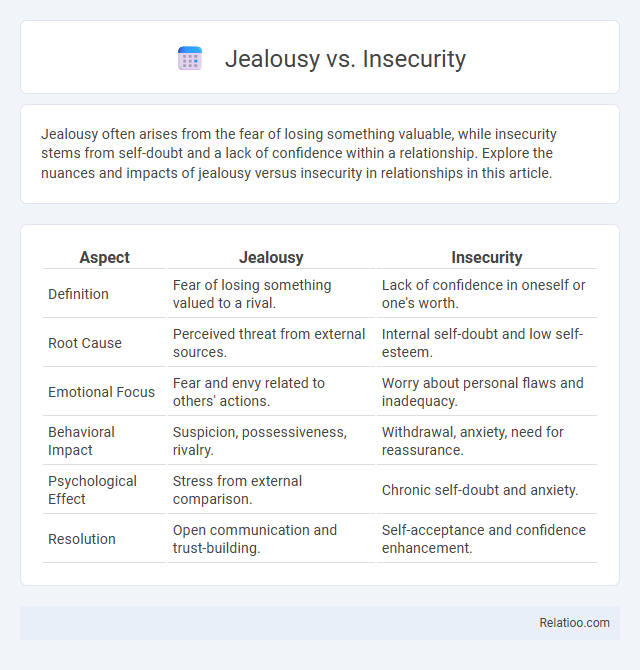Jealousy often arises from the fear of losing something valuable, while insecurity stems from self-doubt and a lack of confidence within a relationship. Explore the nuances and impacts of jealousy versus insecurity in relationships in this article.
Table of Comparison
| Aspect | Jealousy | Insecurity |
|---|---|---|
| Definition | Fear of losing something valued to a rival. | Lack of confidence in oneself or one's worth. |
| Root Cause | Perceived threat from external sources. | Internal self-doubt and low self-esteem. |
| Emotional Focus | Fear and envy related to others' actions. | Worry about personal flaws and inadequacy. |
| Behavioral Impact | Suspicion, possessiveness, rivalry. | Withdrawal, anxiety, need for reassurance. |
| Psychological Effect | Stress from external comparison. | Chronic self-doubt and anxiety. |
| Resolution | Open communication and trust-building. | Self-acceptance and confidence enhancement. |
Understanding Jealousy: Definition and Causes
Jealousy arises when you perceive a threat to something you value, often linked to fear of loss or inadequacy. It differs from insecurity, which stems from self-doubt, and comparison, which involves evaluating yourself against others. Understanding jealousy involves recognizing its root causes, such as attachment issues, low self-esteem, or past experiences of betrayal.
What Is Insecurity? Roots and Manifestations
Insecurity stems from deep-seated fears of inadequacy and self-doubt, often rooted in past experiences, rejection, or perceived failures. It manifests as persistent anxiety, self-sabotage, or a constant need for validation. Understanding your insecurity allows you to address these patterns and build healthier self-esteem.
Key Differences Between Jealousy and Insecurity
Jealousy involves fear of losing something or someone to a rival, often triggering possessiveness and distrust toward others. Insecurity stems from a lack of self-confidence and self-worth, causing you to question your value and abilities independently of any external threat. While jealousy is externally focused on potential competitors, insecurity is internally driven by self-doubt, making each experience distinct in emotional origin and impact.
How Jealousy Manifests in Relationships
Jealousy in relationships often manifests through suspicion, possessiveness, and an intense fear of losing your partner to someone else, which can lead to controlling behaviors and emotional distress. It differs from insecurity, which stems from low self-esteem and self-doubt that affect your confidence within the relationship. Comparisons with others fuel jealousy by amplifying feelings of inadequacy and resentment, disrupting trust and intimacy between partners.
Identifying Signs of Insecurity
Signs of insecurity often manifest as constant self-doubt, sensitivity to criticism, and frequent need for reassurance in personal and professional relationships. Unlike jealousy, which involves fear of losing something to others, insecurity centers on a lack of self-confidence and perceived inadequacy. Recognizing behaviors such as avoiding challenges, excessive apologies, and negative self-talk can help distinguish insecurity from jealousy and unhealthy comparison.
The Psychological Impact of Jealousy vs Insecurity
Jealousy often triggers feelings of threat to your existing relationships, causing emotional distress and increased anxiety. Insecurity, however, stems from self-doubt and low self-esteem, which can lead to chronic stress and diminished mental well-being. Unlike jealousy, insecurity affects your overall sense of self and can negatively impact multiple areas of your life, intensifying feelings of vulnerability.
Common Triggers: What Fuels Jealousy and Insecurity
Common triggers fueling jealousy and insecurity include perceived threats to self-worth, such as the fear of losing a valued relationship or feeling inadequate compared to others. Social comparison, especially in areas like career success, physical appearance, or social status, intensifies feelings of jealousy and insecurity. Past experiences of betrayal or rejection exacerbate these emotions by reinforcing doubts and fears about one's value and security.
Strategies to Overcome Jealousy and Insecurity
Overcoming jealousy and insecurity requires cultivating self-awareness and practicing self-compassion to rebuild your inner confidence and reduce emotional triggers. Engage in positive self-talk and mindfulness techniques to shift focus from comparison toward personal growth and gratitude for your unique qualities. Developing healthy communication skills and setting boundaries can further protect your mental well-being and foster stronger relationships.
Jealousy vs Insecurity: Myths and Facts
Jealousy and insecurity often get confused, but jealousy is the emotional response to a perceived threat to a valued relationship, while insecurity stems from a lack of self-confidence and fear of inadequacy. A common myth is that jealousy always signals insecurity, yet jealousy can occur even in confident individuals when feeling protective or possessive. Research indicates that addressing insecurity through self-esteem building can reduce jealousy intensity, highlighting distinct psychological mechanisms behind each emotion.
Cultivating Healthy Self-Esteem and Emotional Balance
Jealousy often stems from insecurity, which arises when individuals doubt their self-worth, while comparison fuels these feelings by measuring oneself against others. Cultivating healthy self-esteem requires recognizing personal strengths and embracing imperfection without negative self-judgment. Emotional balance is achieved through mindfulness practices and self-compassion, enabling individuals to manage emotions constructively and reduce the harmful impact of jealousy and insecurity.

Infographic: Jealousy vs Insecurity
 relatioo.com
relatioo.com